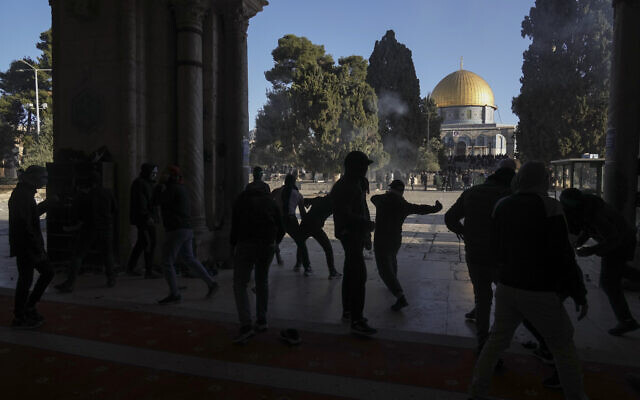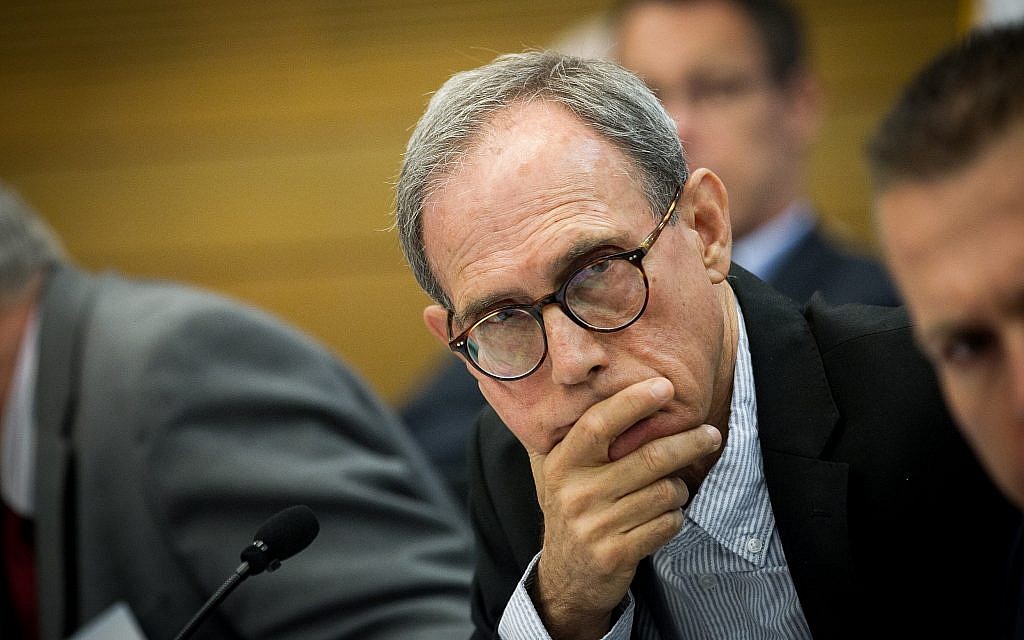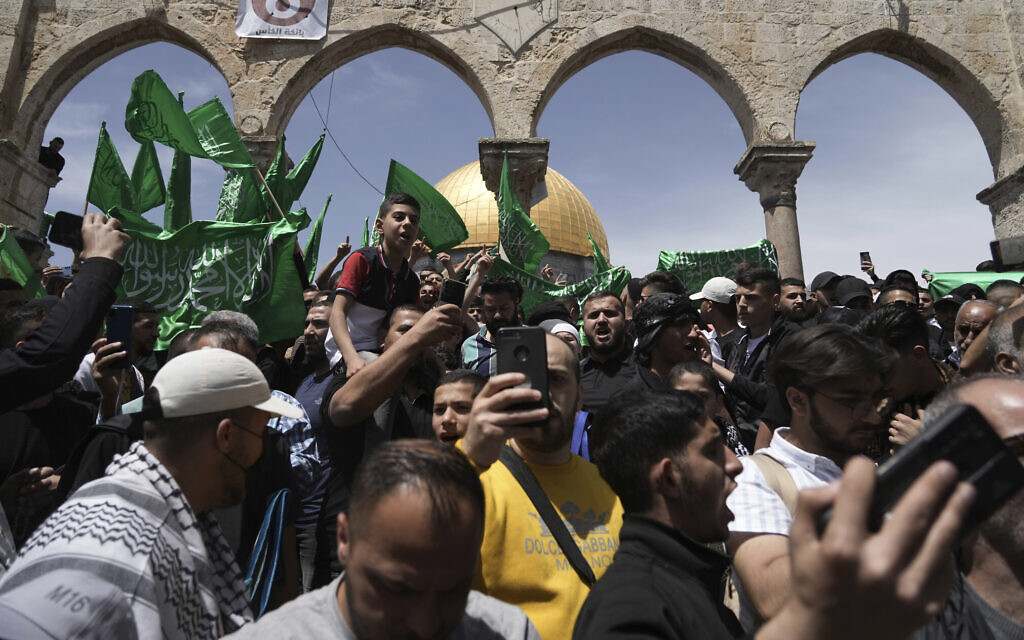‘The price will be huge’: Nachman Shai says more Jews are visiting the flashpoint holy site, with some praying there, leading to an escalation

Palestinians clash with Israeli security forces at the Al Aqsa Mosque compound atop the Temple Mount in Jerusalem’s Old City Friday, April 15, 2022. (AP Photo/Mahmoud Illean)
Diaspora Minister Nachman Shai said Saturday that the delicate status quo on Jerusalem’s Temple Mount was deteriorating as more Jews accessed the holy site, and warned that there will be harsh consequences.
“There are a lot more Jews who are going up to the Temple Mount. There are some that stop on the way and pray, which was forbidden,” Shai told the Kan public broadcaster.
“There is a certain escalation, a certain deterioration. Also with the status quo. They opened the Mount, and let more and more Jews go there,” Shai said.
“The price that we will pay later, all of us, will be huge,” he said.
The Temple Mount is the holiest place in Judaism as the site of the biblical temples. Al-Aqsa Mosque, which sits atop the mount, is the third holiest shrine in Islam.
Jews are allowed to visit the compound, but not pray or perform religious rituals, as part of the sensitive status quo.

MK Nachman Shai seen at the Knesset in Jerusalem, on June 20, 2016. (Miriam Alster/Flash90)
In recent years, some Jewish hardliners have pushed to allow Jewish prayer at the site in a movement that has been gaining steam. Police in the past ejected any person suspected of prayer, but have been seen to turn a blind eye to some Jewish prayers there.
Jews have also been increasingly visiting the site, with the past week’s Passover holiday bringing a record 4,600 Jewish visitors.
The site’s religious significance has made it a frequent flashpoint and the emotional epicenter of the Israeli-Palestinian conflict. Clashes at the Temple Mount can snowball into wider violence; police actions to quell riots there last year were among the triggers of an 11-day war in Gaza last May.
The Temple Mount and Jerusalem have been a tinderbox this month, as Passover overlapped with the Muslim holy month of Ramadan, which is typically a period of high tension. Police have repeatedly clashed with Palestinian rioters on the compound in recent weeks.
Hamas and other Gaza terror groups have called the site a red line and urged an escalation against Israel over the site.
Tensions at the Temple Mount have also strained Israel’s ties with Arab allies, who have demanded an end to Jewish prayer there.
Jerusalem has sought to stress its commitment to the status quo in recent weeks as Palestinians and their supporters in the Arab world accuse Israel of violating it and of seeking to “divide” the Al-Aqsa Mosque compound.

Palestinians chant slogans and wave Hamas flags after Friday prayers during the Muslim holy month of Ramadan, hours after Israeli police clashed with protesters at the Temple Mount compound in Jerusalem’s Old City, April 22, 2022. (AP Photo/Mahmoud Illean)
Israel Police have entered the compound several times in order to quash Palestinian riots during Ramadan. The most intensive violence took place on Friday, April 15, after police said Palestinians hurled stones they had stockpiled inside Al-Aqsa Mosque toward the Western Wall, below. Police entered in force and clashed with dozens of Palestinians shortly after dawn prayers. Over 150 Palestinians were wounded and some 400 were arrested in the rioting that ensued. Clashes have continued on a near-daily basis since.
Thursday was the last day Jewish visitors were allowed on the Temple Mount until the end of Ramadan on May 2. The policy of barring Jewish visitors on the last 10 days of Ramadan has been standard for years as the end of the holy month brings an uptick of Muslim worshipers to the site.
Earlier this month, Jewish extremists called for a Passover sacrifice on the Temple Mount, inflaming Palestinians and drawing threats from terror groups. Prime Minister Naftali Bennett’s government ruled out the possibility of any sacrifices and made several arrests to prevent them.
Israel extended sovereignty to the Temple Mount and East Jerusalem after capturing the area from its Jordanian occupiers in the 1967 war, but allowed the Jordanian Waqf to continue to administer the Mount, known to Muslims as the Haram al-Sharif.



I’ve never understood why Israel didn’t just take total possession of the TM when they recaptured Jerusalem. The Israeli government stupidly (in my view) ceded the authority over who can access the TM to the Muslim religious governing body, the waqf. Why? If Israel had retained possession and made entry to Muslims conditional on zero violence, they would not now be facing this new wave of terrorism. My advice would be, just go in and re-take it, and kick everyone else out until a true non-aggression pact is signed.
so to nachman it’s those damn jews going up and praying on THEIR holy temple site which is the match lighting the fire.
disgusting secular jooish cowardice.
The TM has always been a “flagship” of Islamic violence.
Should be denied access to ALL until zero violence become a precondition.